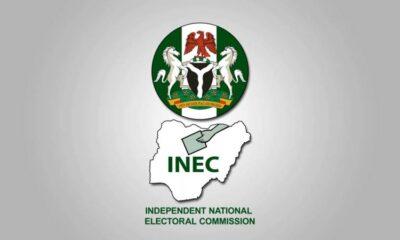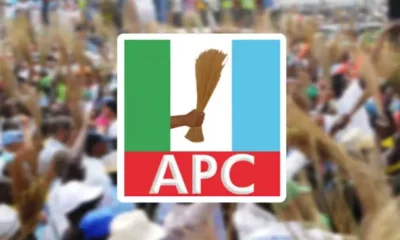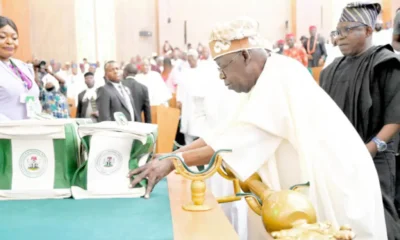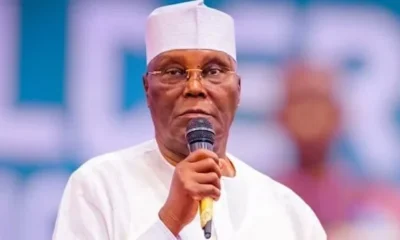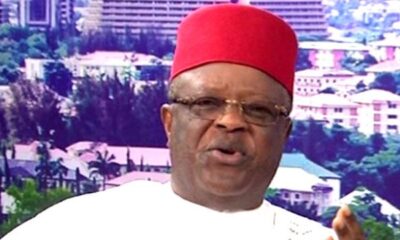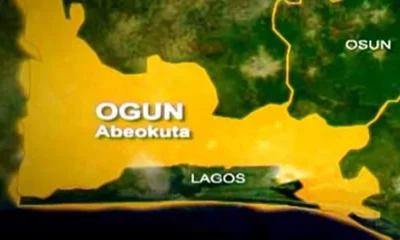Opinion
Go on, Fubara, become a hero

We made so much noise and raised plenty of eyebrows, but Sir Siminalayi Fubara was successfully sent packing from office for six months in a controversial display of federal might and presidential powers by President Bola Ahmed Tinubu. On Wednesday, Fubara was officially restored to office. In summary, he lost the battle for supremacy with his predecessor and benefactor, Chief Nyesom Wike, who is a minister in Tinubu’s cabinet. When the war broke out, I was never in doubt as to who the president would support. Tinubu is not just a godfather who does not take kindly to rebellion, we also know Wike played a major spoiler role to help Tinubu win the 2023 presidential election.
Therefore, my money was on Wike winning the derby with Fubara. And win he did. That does not mean I was not surprised, or even disappointed, that Tinubu imposed emergency rule and sent Fubara on suspension. In another life, Tinubu would have argued vigorously that the constitution does not empower anyone else but the House of Assembly to sanction a governor. Tinubu did oppose the abuse of power to which President Olusegun Obasanjo subjected us to for eight years. Obasanjo suspended governors and appointed retired military officers as administrators. Tinubu did exactly the same thing, naming Vice Admiral Ibok Ibas, a former chief of naval staff, as administrator.
One of the most telling things that happened in Rivers state under the emergency was the recent council elections. How can you hold elections during a state of emergency? That must be a global first. The idea behind a state of emergency is that there is chaos and disorder during which things cannot run their normal course, so you have to suspend certain aspects of the constitution to allow for extraordinary measures to be applied. That is certainly not the time to hold council elections. If the governor and legislators are not functioning — as important as they are in the hierarchy — what is the urgency to install council chairpersons and councillors? Only a few people are fooled by this.
All said and done, Fubara is now back in office. As Wike boasted during an interview with Channels TV, “If we don’t want this state of emergency to be lifted, we would have done one or two things to ensure that it continues.” He has demonstrated how powerful he is in this government, and I don’t think anybody should fool with him. If Tinubu decides to extend the emergency rule for another six months, all we will do is make more noise and raise more eyebrows but Wike will have his way. Let’s not kid ourselves. The National Assembly will approve it via WhatsApp or do voice vote again. Heavens will not fall. Obasanjo and Tinubu have really done us a “strong thing” in this country.
We can only hope that peace will now return to Rivers in its true meaning. Wike has openly promised to give the governor his space. He said: “I cannot go and impose anything on the governor. Why would I? Assuming I go to the governor and say, ‘I want this,’ will the state collapse? I will not. I have no candidate (for commissionership), and I will not [have],” Wike said. As a form of affirmation on their new relationship, he said emphatically: “I have already said that we’ve been speaking. I will not engage with a man I have not forgiven. Everything is over. We must move forward.” It must be noted, however, that most members of the House of Assembly are still loyal to Wike, so he still has the rope.
On his part, Fubara has promised to pursue peace. In his broadcast, he said: “In the course of the six-month period, Mr. President graciously brokered the peace process with all the parties successfully. Our Leader, His Excellency, Nyesom Ezenwo Wike, CON, all members of the Rivers State House of Assembly and I, as your Governor, have all accepted to bury the hatchet and embrace peace and reconciliation in the best interest of our dear Rivers State.” In what should be re-assuring, Fubara concluded: “We believe the political crisis is now behind us and that peace and stability have once again returned to Rivers State, though not without the hard lessons learnt from the emergency rule.”
For peace to reign in the political arena of Rivers state, all the key actors must keep to their words. Wike, in his role as the “Our Leader” (as the governor described him), should stand by his public statements that he would let the governor be. He has every reason to protect his political structure if the governor was indeed chipping away at it — but there is a thin line between safeguarding your territory and diminishing or humiliating a governor, even if you are the one that installed him. Every human being wants some respect. Indeed, respect begets respect. When someone feels unduly disrespected, it is just a matter of time before he or she begins to show resistance. That is a fact.
Now that he is back in the saddle, he can decide what he wants to use power for: to serve the people of Rivers state with “heart and might” or engage his godfather in another game of wits. He can choose to become a hero to his people. He can choose to serve his people faithfully by touching their lives for the remainder of his tenure. He can focus on making sure every village has electricity, every primary health care centre has personnel and drugs, every school has teachers and desks, and every community has water to drink. He can choose to make every senatorial district and every local government much better than they are. These are easy wins. And his people will love him to death.
Alternatively, he can choose to engage his godfather in another round of the battle for supremacy. I don’t think he can win that fight. He has just been worsted. The president has shown clearly to all of us where he pitches his tent. He has the security agencies at his beck and call and will not fail to deploy them as he deems appropriate. One legacy Obasanjo left behind in 2007 is that if you have presidential power in a third world country, you must know how to use, misuse and abuse it. The fact that Presidents Umaru Musa Yar’Adua, Goodluck Jonathan and Muhammadu Buhari were somewhat restrained in their use of presidential powers does not mean every other president will follow suit.
Finally, I really would want this issue of emergency rule conclusively sorted out. Can an elected governor be suspended from office by the president? The 1999 Constitution clearly spells out how a governor can be removed: it is only by the House of Assembly after an impeachment process. There is no constitutional provision whatsoever that empowers the president to remove a governor under any circumstance. My understanding is that what a law does not provide for, you cannot import into it. I would instinctively conclude, therefore, that a governor cannot be removed by the president. In a federation, the president is not superior to a governor except in maters listed on the exclusive list.
But here is the catch. Tinubu did not remove Fubara — he only suspended him. Suspension is not the same thing as removal. The one is temporary, the other permanent. And section 305(d) of the constitution says he can take “extraordinary measures” to avert “a clear and present danger of an actual breakdown of public order and public safety in the Federation or any part”. If the president determines that the governor is a danger to the community, he can claim that suspending him is an extraordinary measure that needs to be taken. It is a loophole that a clever lawyer can explore to justify the suspension. When you create a loophole like this, you can’t blame people for exploiting it.
The Supreme Court has always failed to make a pronouncement on this emergency rule controversy, specifically on the issue of sanctioning a governor with suspension. Since Obasanjo started the game with Plateau state in 2004, the Supreme Court has tactically avoided making a definitive pronouncement on the legality of suspending a governor. It chose the technical ground in the Plateau issue, ruling that the plaintiff, Governor Joshua Dariye, did not have the locus as he was no longer in office. The unwritten explanation is that in matters of national security, the apex court does not want to interfere so as not to impede the president’s ability to maintain peace, law and order.
I would suggest that an amendment be made to the laws to remove any doubts about the powers of the president in emergency rule. We should not leave such an important matter hanging. With sincerity of purpose, we can address our political and constitutional challenges in a decent way. Our democracy is evolving and our constitution is being fine-tuned regularly to address emerging issues. We should not waste the Rivers crisis. As Fubara said, it has been a teachable moment for everyone. I welcome Fubara back to office with these words: go on, create a legacy of good governance and let your people remember you as one of the greatest governors ever. Against such, there is no law.
AND FOUR OTHER THINGS…
FIRE-FIGHTING APPROACH
I commiserate with those who lost their loved ones in the fire tragedy at the Afriland Towers, Lagos, on Tuesday. It is so devastating! However, without first investigating and establishing the cause of the incident, the Federal Fire Service has announced plans to conduct a “nationwide fire safety compliance audit”. Sadly, we make policies on impulse in Nigeria. We usually start from the solution before researching the problem. Otherwise, we should first investigate what went wrong at Afriland Towers and then conduct an audit based on the findings in order to address the challenges robustly. How can policies be effective when they are based on conjectures and assumptions? Commonsense.
LONG HISTORY
For those who believe the removal of history from school curriculum is the root of our problems, they now have an opportunity to prove it. The federal government has restored the subject, 16 years after it was removed. To be clear, I am fully for history to be taught — although I learnt the history of Nigeria by research as I did not take the subject in secondary school. I am happy history is back: I am tired of reading on social media that “it is because history is no longer taught in schools” that someone has just spewed some nonsense. I want to monitor how this will impact discourse in the years ahead. My hunch is that teaching history does not give sense to the senseless. Observing…
RICE AND SHINE
Nigerian celebrity chef, Ms Hilda Baci (pronounced as “Bassey”), has entered the Guiness World Records (GWR) again, this time for preparing jollof rice over a nine-hour period, cooking 8,780 kilogrammes of our favourite dish. While this generated a lot of excitement among Nigerians, some eternal cynics insisted that we should be celebrating only nuclear feats and Nobel prizes. Pouring water on the jollof feat is in bad taste. God that gives people talents in different spheres of life knows what he is doing. No gift should be despised. Our footballers and artistes are doing us proud all over the world. Nigerians have a right to be excited in this season of gloom and doom. Distasteful!
NO COMMENT
We see plenty nonsense in Nigeria every day, including those appointed as special assistants also appointing special assistants. Nasir Ja’oji, the senior special assistant (SSA) to the president on citizenship and leadership, has taken it to another level. There is the little matter that he has named three media aides. Just imagine an SA having five media aides. How many would he have if he were a minister or governor? For you to know the joke that we have turned governance to in Nigeria, Ja’oji has also appointed two directors-general — a title used by heads of some parastatals. What next? All things equal, he will soon appoint permanent secretaries and commanders-in-chief. Hmm?
•Written By Simon Kolawole
-

 News24 hours ago
News24 hours agoRigging: INEC RECs risk two-year jail term
-

 Sports24 hours ago
Sports24 hours agoEPL: Arsenal Restore Five-Point Lead After Win In North London Derby
-

 Politics16 hours ago
Politics16 hours ago2027: Real-time results transmission achievable, say telcos
-

 Politics23 hours ago
Politics23 hours agoBy-Election Wins, Referendum On Tinubu Presidency – Lagos APC
-

 News24 hours ago
News24 hours ago2025 Budget: Capital Without Cash
-

 Politics24 hours ago
Politics24 hours agoFCT Poll: Low turnout shows democracy is being suffocated – Atiku
-

 News23 hours ago
News23 hours agoUmahi denies rift with Julius Berger, insists on equal standards
-

 Metro24 hours ago
Metro24 hours agoAwujale: Ruling family demands gov resume selection process



